My son says "I can't hold the pencil"
This article will give an idea for all the mothers that How to improve the fine motor skill in the child development

As a mother I want my child to write well at the early stage. Everyday is the struggle between me and my son while practicing writing. One day he says "Mom, I couldn't hold the pencil". Then I realised and start to find the several reasons why your child is having difficulty holding a pencil. There I found a common reason - Underdeveloped fine motor skills i.e. Holding a pencil requires coordination and strength in the small muscles of the hand and fingers. If your child's fine motor skills are still developing, they may find it challenging to grasp and control the pencil.
What is Fine Motor Skill?
Fine motor skills refer to the ability to make precise movements with the small muscles in the hands, fingers, and wrists. These skills are crucial for tasks that require dexterity and coordination, such as writing, drawing, buttoning clothing, using utensils, and manipulating small objects. In children, the development of fine motor skills typically progresses from simple movements, like grasping and releasing objects, to more complex actions, such as tying shoelaces or using scissors. Fine motor skills play a significant role in a child's overall development, as they contribute to academic success, independence in daily activities, and overall physical coordination. Activities that promote fine motor skill development include playing with building blocks, threading beads, drawing, cutting with scissors, and engaging in arts and crafts projects.
There are many activities and strategies parents and caregivers can use to help develop fine motor skills in children.
Here are some effective methods
Play with manipulative toys: Provide toys and games that require manipulation of small objects, such as building blocks, puzzles, Lego sets, and shape sorters. These activities encourage hand-eye coordination and precision.
Drawing and coloring: Encourage your child to draw, color, and trace shapes using crayons, markers, and pencils. This helps strengthen hand muscles and improves control over writing utensils.
Playdough and clay: Playing with playdough or clay allows children to practice squeezing, rolling, pinching, and shaping, which all promote fine motor skill development.
Use of scissors: Provide child-safe scissors and encourage your child to practice cutting various materials like paper, straws, or playdough. Start with simple cutting exercises and progress to more complex patterns as their skills improve.
Stringing beads: Stringing beads onto a string or pipe cleaner helps children refine their pincer grasp and hand-eye coordination.
Buttoning and zipping: Practice activities that involve buttoning shirts, zipping jackets, and fastening snaps. These tasks require precise finger movements and are essential for developing independence in dressing.
Cooking and baking: Allow your child to help with age-appropriate tasks in the kitchen, such as stirring, pouring, kneading dough, and using utensils. These activities enhance hand strength and coordination.
Playing with small objects: Provide opportunities for your child to play with small objects like coins, keys, and pegs. Sorting, stacking, and manipulating these items can improve fine motor skills.
Drawing in sand or rice: Drawing shapes, letters, or patterns in a tray of sand or rice can be a fun way to practice fine motor skills while providing sensory stimulation.
Outdoor activities: Activities like digging in the sand, picking flowers, or playing with small gardening tools can also promote fine motor skill development.
Consistency and patience are key when helping children develop fine motor skills. Encourage exploration and provide opportunities for practice in various activities to support their overall development.
Some other factors that Child finds difficult in holding the pencil
- Lack of exposure or practice: Your child may not have had enough opportunities to practice holding and using a pencil. Like any skill, pencil grasp improves with practice and experience.
- Incorrect grip: Your child may be using an incorrect grip on the pencil, such as gripping too tightly, holding it too close to the tip, or using an inefficient grasp pattern. This can make writing uncomfortable and difficult.
- Sensory issues: Some children have sensory sensitivities that can affect their ability or willingness to hold certain objects, including pencils. They may find the sensation of holding a pencil unpleasant or uncomfortable.
- Muscle weakness or coordination issues: Certain medical conditions or developmental delays can affect muscle strength and coordination, making it challenging for a child to hold a pencil properly.
- Lack of interest or motivation: If your child is not interested in drawing or writing activities, they may be less inclined to practice holding a pencil.
Conclusion
If you're concerned about your child's difficulty holding a pencil, consider consulting with a pediatric occupational therapist or your child's pediatrician. They can assess your child's fine motor skills and provide recommendations or interventions to help improve pencil grasp and overall fine motor development. Additionally, you can encourage your child to engage in activities that promote hand strength and coordination, such as the ones mentioned in the previous response.
About the Creator
Renuka R
Renuka, a multifaceted teacher & love for nurturing young minds.She found a steadfast passion for the written word,through the whimsical verses of poetry, stories & educational content tailored for students & engage audiences of all ages.
Enjoyed the story? Support the Creator.
Subscribe for free to receive all their stories in your feed. You could also pledge your support or give them a one-off tip, letting them know you appreciate their work.





Comments
There are no comments for this story
Be the first to respond and start the conversation.